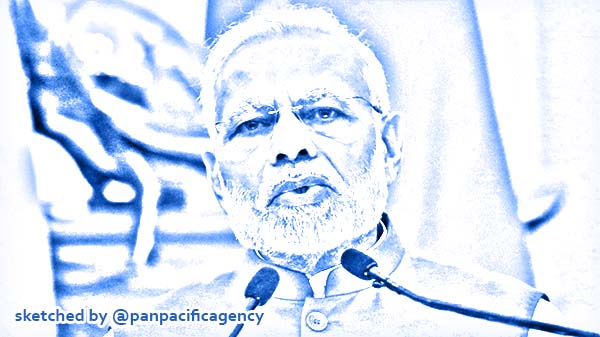[Analytics] Unlike Trump, Modi seems immune from criticism on coronavirus cases

Pic courtesy: Reuters. Sketched by the Pan Pacific Agency.
India is in crisis. Its economy has crashed, with the largest slump on record decimating millions of jobs. Its already fragile healthcare system is struggling. With more than five million cases, India ranks only behind the United States for confirmed infections. Vedika Sud, Nectar Gan specially for the CNN.
But whereas other populist leaders are feeling the political heat from their handling of the pandemic — US President Donald Trump and his British counterpart Boris Johnson, for instance — Indian Prime Minister Narendra Modi has largely escaped the scathing headlines and crushing opinion polls that have beleaguered his counterparts.
Modi’s landslide re-election for a second five-year term last year gave him a sweeping mandate to push his Hindu nationalist agenda, in a country where 80% of the population is Hindu. Asim Ali, a researcher at the Delhi-based Centre for Policy Research think-tank, said the Indian leader is seen as a “national messiah” who is working on a grander agenda to reshape the Indian nation and is not accountable for day-to-day government failures.
“Modi has staked out for himself the role of not just the political leader of India, but also its social, moral and spiritual leader, in the mold of Mahatma Gandhi,” Ali said.
Over the past year, Modi has made steady headway on Hindu nationalist policies, from revoking the autonomy of Jammu and Kashmir, India’s only Muslim-majority state, to backing a controversial citizenship law that critics say discriminates against Muslims.
But his second-term aspirations to revitalize the economy now seem more distant than ever due to the pandemic. As it continues to batter the Indian economy, analysts say it’s unclear if the populist leader can emerge politically unscathed.
The facts
Compared with other world leaders, like Brazilian President Jair Bolsonaro — who downplayed the threat of the pandemic and dismissed the coronavirus as a “little flu” only to be infected later himself — Modi took the coronavirus seriously from the beginning and acted swiftly.
When he ordered a nationwide lockdown on March 24, the country of 1.36 billion had reported just over 500 coronavirus cases and 10 deaths.
“You have seen how the most powerful nations have become helpless in the face of this pandemic,” Modi said in a live televised address to the nation, as he announced the lockdown, warning that India could be set back decades if the outbreak was not dealt with properly.
“There is no other way to remain safe from coronavirus … we have to break the cycle of infection,” he said.
By taking drastic action early, Modi reaffirmed his image as a decisive leader who is able to take strict, politically tough measures for the sake of the country, said Ali, the researcher at the Center Policy Research.
He is seen as a “saintly figure who means well and always acts in the larger national interest,” said Ali.
Indian public health experts, however, have differed on their support for the timing and effectiveness of the lockdown. Ramanan Laxminarayan, a senior research scholar at Princeton University, said it was essential because infections were increasing rapidly at the time, and that it helped decrease disease transmission.
Others, including virologist T. Jacob John, argue the lockdown was imposed too early and too widely, when cases were still low and concentrated in specific regions. Consequently, more people were impacted by the resultant economic slowdown than needed to be, and not enough resources were available to support slum areas, for example, where lockdown measures including social distancing were impossible.
The unsustainable nature of the nationwide lockdown merely delayed the spread of the outbreak.
“Now, looking back it was clearly a mistake. We should have waited for longer. Because we didn’t stop the pandemic,” said economist and Nobel laureate Abhijit Banerjee.
What most experts agree on is that India’s lockdown — the largest and one of the strictest in the world — was imposed with not enough notice or planning. Coming into effect less than four hours after it was announced, the measures brought the country to a virtual standstill and triggered a migrant crisis.
In the cities, poor day laborers were suddenly jobless. Many had no choice but to return to their home villages, but with trains and public transport suspended, some walked for hundreds of miles.